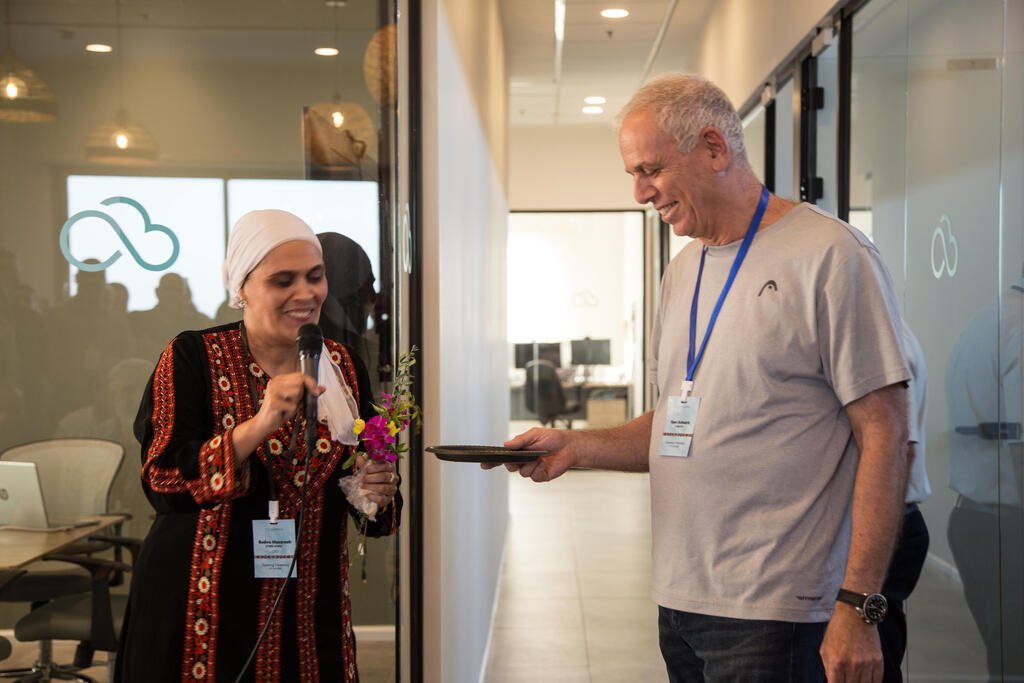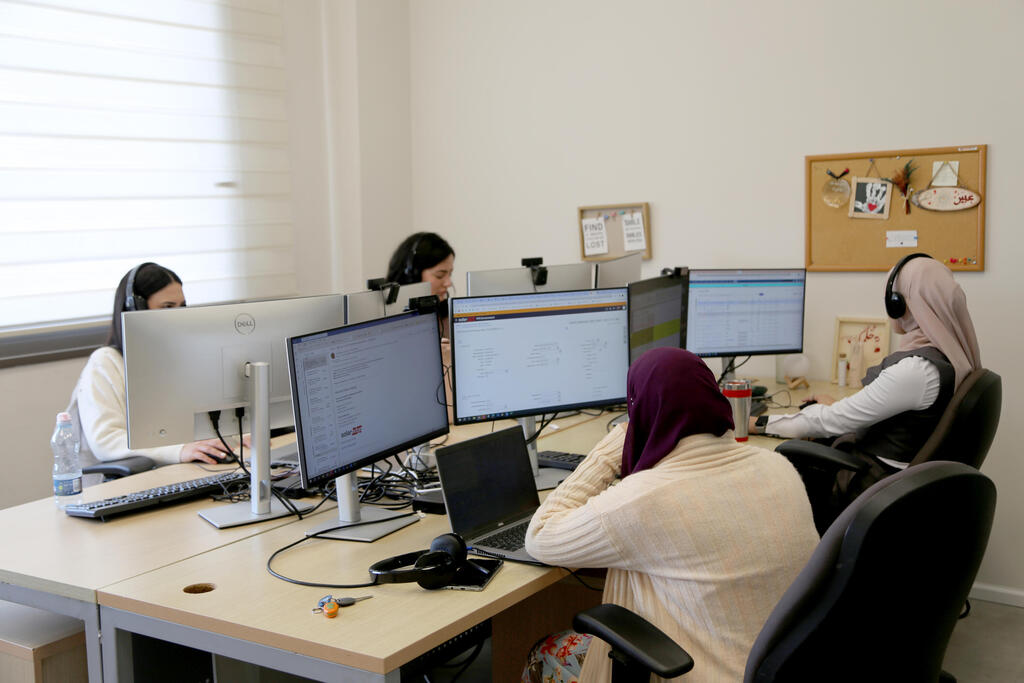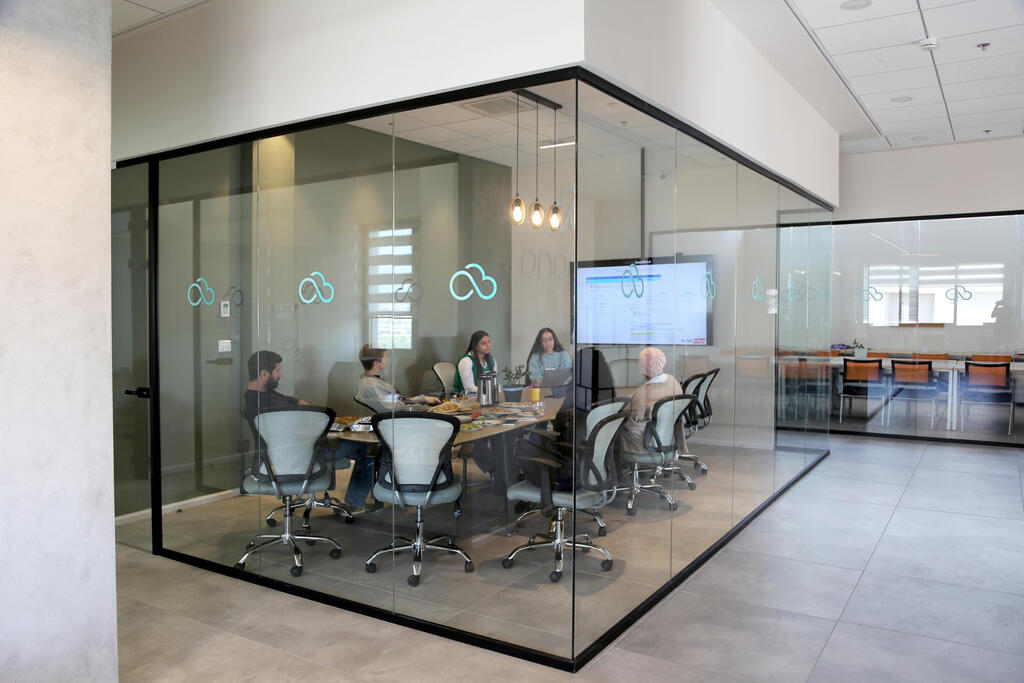“If Israel wants to grow and become a better state, it must focus on inclusion of all sectors in its society, secular, religious, ultra-orthodox, Israel Arabs, etc.” Schwartz told CTech. “At the end of the day, we are all one nation sharing the same land.”
Portland’s trailblazers: Breaking boundaries, closing gaps in Israeli high-tech
“When I was growing up, the only jobs outside the home that were considered acceptable in our patriarchal Bedouin culture were to be a teacher, or perhaps a social worker. High-tech was never a consideration, there was a firm glass ceiling. It wasn’t the right environment, plus there is the issue of traveling to Tel Aviv or Haifa. Portland’s women-only tech hubs solve those problems for Bedouin and Druze women. Also, Portland provides the training and high-tech connections and opportunity. I only wish I had such an option when I was younger. There is a huge potential here.”
The Portland Trust (TPT) was established in 2003 by Sir Ronald Cohen and Sir Harry Solomon. Its mission is to promote peace and stability in the area through economic development. TPT Israel is focused on enhancing economic opportunities for Arab and ultra-Orthodox societies and other periphery communities.
Schwartz points out that Portland Trust Israel’s management team reflects the organization’s diversity. “Of our four partners, two are men and two are women. Two of them are Jewish, myself and Einath McMurray Aharon, and two are Israeli Arabs, Dr. Nasreen Haddad Haj-Yahya and Aiman Saif.”
How many participants are in your programs?
Schwartz: “We have over 220 graduates who are already placed in core high tech positions, plus an additional 100 that are in the midst of various training stages. To be more specific, we currently have 110 Druze (90% women), 30 Bedouin women, 110 Arab youngsters (50% women) and 70 Haredi (ultra-Orthodox) men in our various programs.”
So far, hundreds of young people from the Druze, Bedouin, Arab-Israeli and ultra-orthodox Jewish communities have successfully integrated in a variety of professions: DevOps Engineers, Backend and Full Stack Developers, Automation QA Engineers, Manual QA Testers and Data Analysts.
When asked to name some of the high-tech companies Portland Israel graduates have been place at Schwartz rattles off a long list including: Wix, Monday, Amdocs, Radcom, Vayyar, Personetics, Dataloop, Finastra, Pagaya, Incredibuild, and more.
How is Portland different from other organizations in Israel helping the Israeli Arab and ultra-Orthodox populations get into high-tech?
Schwartz: “That’s an excellent question. The common denominator of Portland’s initiatives is the ability to reach talents who are currently not integrated in the high-tech industry, and place them in leading companies in the industry. Unlike other initiatives, Portland Israel’s aim is on work integration, not job training.”
How does it work?
Schwartz: “Portland works to locate the talent that couldn’t find its way into Israel high-tech, and build the needed infrastructure to successfully integrate tech professionals from the social and geographical periphery, into Israel’s tech industry. The candidates for our programs undergo a very rigorous screening process and once accepted receive professional and employability skills training. Our programs’ graduates are placed as juniors in the core of Israeli high-tech. Once they are placed in a job, they continue to be supported by The Portland Trust.”
A cornerstone of Portland Israel’s model is to open remote tech hubs (employment centers) for the populations that due to cultural and religious limitations can’t work in a mixed gender environment in the firms’ headquarters. Consequently, tech employers enrich their teams with workers who were previously inaccessible to employers.
The Lotus program, operating from a tech hub in the Druze town of Daliyat al-Karmel, offers a unique Full Stack-Bootcamp program for Druze young women who want to develop a career in tech and lead social change. Similarly, Samana, operates a women-only tech hub for Bedouin young women in the village of Zarzir, providing an intensive four-month long bootcamp, that helps participants find their place in the tech world, with careers in QA and QA automation for ERP and CRM systems.
Portland’s Fursa (“opportunity” in Arabic) program recruits outstanding computer science graduates from the Arab community, trains and prepares them for specific high-demand roles, and places them into desirable, entry-level positions in the Israeli high-tech industry. On the other side of the spectrum, Beyond Dev is a gateway program into the high-tech industry for highly talented and capable young Arab academics who don’t necessarily have computer science credentials.
Portland’s Tora V’Daat (‘Torah and Knowledge’) program recruits ultra-Orthodox Jewish men, often unable to integrate into quality employment for lack of required credentials, and provides them with the necessary tools and resources to attain a prestigious Computer Science BSc degrees from Jerusalem’s Hebrew University – one of the world’s top-rated academic institutes – and supports them through their studies.
Bushra Mazreeb, as CEO of Samana, what makes it so special?
“Samana means ‘our sky’ in Arabic, but to me it’s so much more than a name – it’s a promise of a better life, one where even the sky is not a limit. Samana aims to create quality employment opportunities for Bedouin women that are adapted to the cultural constraints of their communities. In order to adhere to traditional restrictions, Samana goes beyond training and mentoring to create significant employment opportunities, as well as the local facilities that enable these women to develop their careers. The Samana women-only tech hub in Zarzir provides a safe zone for women taking into account the women’s cultural requirements, while acting as a center of excellence in various technological areas.”
Speaking of religious constraints, Ramadan recently concluded. How many in Samana’s Zarzir hub fasted?
“All 14 of them!” Mazreeb declares proudly. “That too is taken into consideration by the employers, in our case the company SolarEdge, which employs all our Samana participants. It’s just one example of how having such a tech hub in Zarzir is a huge benefit. Women can feel safe, while also making a good salary without compromising their traditions or religious lifestyle. Visually, our tech hub in Zarzir looks just like WeWork in Tel Aviv, except it’s all Bedouin women.”
Rami, one of Portland’s programs trains ultra-Orthodox men. These same men don’t serve in the IDF. Why should Portland Israel further their careers?
Schwartz: “I am very aware of that, but I’ll go back to what I said at the beginning. The only way we can make Israel a better place is by inclusion. The success of Portland’s programs for the ultra-Orthodox and for the Israeli Arab and Druze populations can only further that goal. Remember, these ultra-Orthodox men come to us without basic core studies (math, English, science, etc.) in their backgrounds. We have 70 men in our program now who, thanks to Portland, got accepted to Hebrew University’s computer science program and 11 graduates are already working in high-tech. It’s a huge step in the right direction.”
Related articles:
Portland Israel claims to offer a local alternative to the offshore solution of high-tech companies in Israel. How does that work?
Schwartz: “Often an Israeli high-tech company will hire juniors living abroad for a position, perhaps because it is cheaper or more cost effective. At Portland we say, why give a job at an Israeli high-tech company to somebody from Poland or the Ukraine where there are skilled and worthy candidates here in Israel living in the periphery? Let’s keep the jobs in Israel. Also, our graduates are loyal; we have over a 90% retention rate. They don’t jump from job to job. The government is also involved in providing employers incentives to hire within Israel. Portland is not taking away jobs from Israelis; we are saving jobs for people in Israel that would otherwise go to people abroad.”
How did October 7 and the ensuing war affect Portland Israel?
“The war led to a situation the State of Israel had never been in before in its history,” Schwartz explains. “Hundreds of thousands of residents of the north and south are no longer living in their homes. Since the war began, Portland Israel has begun to work with government ministries, the Innovation Authority, and others to establish a government program whose goal is to add thousands of new high-tech jobs in the north and south for residents of those regions. Notice I stress the word ‘residents’, not necessarily for the disadvantaged populations we normally work with, but for the Israeli residents living in those areas. We are now in a crisis situation. Portland Israel sees this great need as an opportunity.
“I’ll tell you something else,” Schwartz adds. “As you know, many high-tech workers all over Israel were called up to the army on October 7th. So, who stepped up in their place? It was the Druze, Israeli-Arab and ultra-Orthodox workers who were not called up who needed to pick up the slack. In other words, our Portland Israel graduates. They took on more shifts, more assignments, they pitched in and did and are doing whatever is needed.”
Bushra, your entrance standards for Samana are very high.
“Our participants already proved themselves in their academic studies, they just never had the opportunity to break into high-tech. Our participants have become role models for the other women in their communities. As for our high standards, if you want to reach the sky (Samana), you have to start high.”























